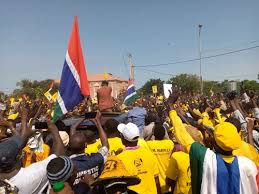APA-Banjul (The Gambia) Gambia’s latest vote has generated the biggest electoral shock yet after the main opposition clinched all key municipalities including the country’s capital, amassing the biggest number of votes in the bargain.
The May 20th poll was seen as a further test of the popularity of President Adama Barrow whose National People’s Party (NPP) had performed below expectation in national assembly elections last year.
This is an exercise coming a month after the election for local councillors witnessed a strong showing by the United Democratic Party, which has hit something of a political revival since its perennial leader Ousainou Darboe lost a presidential vote to his former ally in President Barrow.
Gambians vote using crystal marbles slot inside drums adorned with the colours of political parties and mugshots of their candidates.
In respect of the latest polls both the ruling NPP and the country’s main opposition United Democratic Party shared the electoral spoils on an even keel, winning four municipalities each out of the eight seats that were up for grabs in the election for mayors and local area chairpersons.
However it was the jubilant UDP which emerged basking in an air of triumphalism while amassing a cumulative total of 209, 465 votes nationwide ahead of the NPP which could only muster a dismal national votes total of 194,247.
Thus the NPP has been left licking its ‘electoral wounds’ after ruling party candidates lost crucially in the urban areas of Banjul the capital, the most densely populated municipalities of Kanifing and Brikama and the Mansakonko administrative area.
Against the unrealistically high expectations of party faithful, NPP could only grab the four non-urban seats of Kerewan, Kuntaur, Janjanbureh and Basse, echoing criticisms of it as a once urbanite political force now relegated into one with a rural veneer.
This came as a shock considering that over the past few weeks President Barrow himself had led a spirited NPP campaign to stop candidates of his former party, UDP from winning urban minicipalities seen as crucial in consolidating his political power base.
The People’s Organization for Independence and Socialism (PDOIS) mustered just 3,796 votes, The Gambia Democratic Congress (GDC) 2,614 votes, the former ruling People’s Progressive Party (PPP) 2,023, and The Gambia For All (GFA) 1,227.
The independent candidates who took part in the polls garnered 44,974 votes.
Many interpret the outcome of the latest polls as a resoundingly collective indictment of President Barrow’s leadership by voters in urban areas where general disenchantment about worsening poverty, corruption, rising cost of living, insecurity and economic stagnation has been building in recent years.
”The results show voters universally unhappy with the country’s leadership” said one voter who said although he had voted for President Barrow in the presidential election of almost two years ago, he could not bring himself to voting for his handpicked candidates in the subsequent polls.
”This is a feeling that runs generally among some sections of Gambian society today and may well be a foretaste of things to come for President Barrow and his government if they do not change the dipping fortunes of malcontented Gambians in the intervening years leading up to 2026 when the next election cycle begins with a presidential vote.
The opposition were looking to consolidate their gains from the national assembly and local government elections especially in Banjul and Kanifing where both incumbents (Rohey Malick Lowe and Talib Bensouda respectively) are UDP members who had secured re-election.
In the past those elected to the lower tiers of governmental authority usually faced politically-motivated intrigues and bottlenecks from government ministries, dogging municipal affairs including development drives in The Gambia for decades.
There were fears of the same low voter turnout, which had dogged last month’s local government elections.
At least 962, 157 Gambians were registered by the Independent Electoral Commission to take part in the last election cycle which began with the presidential vote in December 2021.
WN/as/APA


